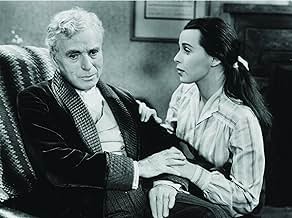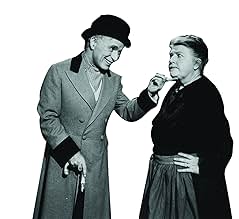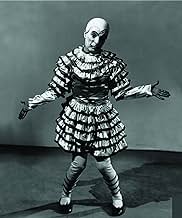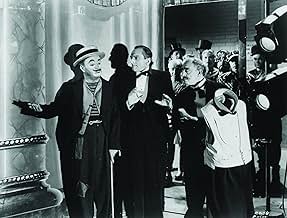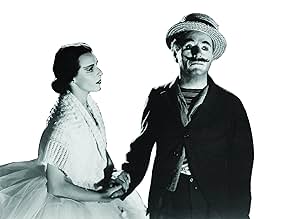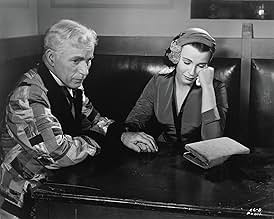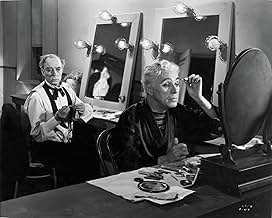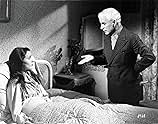PUNTUACIÓN EN IMDb
8,0/10
23 mil
TU PUNTUACIÓN
Un comediante de capa caída y una bailarina de ballet suicida y desanimada deben aferrarse el uno al otro para encontrar un propósito y esperanza en sus vidas.Un comediante de capa caída y una bailarina de ballet suicida y desanimada deben aferrarse el uno al otro para encontrar un propósito y esperanza en sus vidas.Un comediante de capa caída y una bailarina de ballet suicida y desanimada deben aferrarse el uno al otro para encontrar un propósito y esperanza en sus vidas.
- Ganó 1 premio Óscar
- 7 premios y 4 nominaciones en total
Molly Glessing
- Maid
- (as Mollie Glessing)
Leonard Mudie
- Dr. Blake - Calvero's Doctor
- (as Leonard Mudi)
'Snub' Pollard
- Street Musician
- (as Snub Pollard)
Billy Lee Aimone
- Little Boy
- (sin acreditar)
Reseñas destacadas
Charles Chaplin plays Calvero, an aging clown who rescues a ballet dancer called Terry (Claire Bloom) from committing suicide.These two become friends and Calvero gets more meaning to his life.He desperately tries to make a come back to become the greatest clown again but it's hard to make people laugh anymore.Limelight from 1952 was Charles Chaplin's last American film.It was a flop but the film won an Academy Award for best score in 1972.That year the king of comedy got also a special Oscar for career achievement.This was Chaplin's most sentimental movie and it also was very touching.Chaplin is amazing as the aging clown.The man wasn't only a great comedian.He was also a terrific actor.It's hard to top his performance in this movie.Claire Bloom's performance as the ballet dancer is also brilliant.Chaplin's son Sydney plays Neville in the movie.There are also Chaplin's children Victoria, Michael, Josephine, Geraldine and Charles Chaplin Jr. in this film.This is truly a masterpiece.This proves that Chaplin didn't shine only in silent movies.He did that also in talkies.And this is one of his best talkies. The dialogue is just delicious in this comedic drama.In the end you can see another great comedian from the silent era;Buster Keaton.You can see Chaplin and Keaton clowning together in the end.And that is one great scene.A scene to remember.The message of Limelight is how wonderful life is.Enjoy it while you still can.
Chaplin could do anything as well or better than anyone else in movies: acting, writing, directing, composing, producing, editing, even choreographing. He was world renown as a comedian, yet has placed some of the most poignant images on film that ever were. He was, even more than the great Orson Welles, a sort of one man band.
He was as successful worldwide as anyone ever was in movies. Somehow in all this, he got the idea that he had something worthwhile to say about life and art. Which he did with this film.. and I for one am extremely grateful.
The subjects of alcoholism... depression... aging... the fickle relationships of audiences and performers... these are all covered in a film that manages to fit in philosophical dialog, pantomime, dancing, and music. The multiple showings of the same comedy sequence (in a dream, in front of an unappreciative audience, in front of a wildly appreciative audience) gets one to thinking about the lemming-like nature of people in a way that someone like Chaplin would have had almost unique insight into.
It may take a while to become accustomed to the odd pacing and cadence of a Chaplin movie; once you are, you find yourself in the middle of an artistic experience like no other.
The music in this film is unusually haunting and deserving of the Academy award it belatedly received. 10 out of 10.
He was as successful worldwide as anyone ever was in movies. Somehow in all this, he got the idea that he had something worthwhile to say about life and art. Which he did with this film.. and I for one am extremely grateful.
The subjects of alcoholism... depression... aging... the fickle relationships of audiences and performers... these are all covered in a film that manages to fit in philosophical dialog, pantomime, dancing, and music. The multiple showings of the same comedy sequence (in a dream, in front of an unappreciative audience, in front of a wildly appreciative audience) gets one to thinking about the lemming-like nature of people in a way that someone like Chaplin would have had almost unique insight into.
It may take a while to become accustomed to the odd pacing and cadence of a Chaplin movie; once you are, you find yourself in the middle of an artistic experience like no other.
The music in this film is unusually haunting and deserving of the Academy award it belatedly received. 10 out of 10.
Charlie Chaplin is one of the undisputed masters of the cinema. He was one of the funniest actors of the cinema, and he was also one of the greatest directors. Of course, the films that he is most famous for are his silent comedies, especially The Gold Rush, City Lights, and Modern Times. The latter two were the product of Chaplin's stubborn clinging to the format and conventions of the silent cinema, though everyone else had gone to sound. This stubbornness was certainly sound. His contemporaries such as Buster Keaton and Harold Lloyd lost popularity when they moved to sound. Chaplin's last two silent films were popular and made a lot of money. Audiences may have craved sound, but they craved Chaplin, too, and did not disdain his silence. He was one of the silent artists who thought that they were just achieving the peak of their medium when sound came in. He proved himself right, since City Lights (1931) and Modern Times (1936) are probably his two best films, and both are two of the best films ever made.
Finally, in 1940, Chaplin directed and starred in his first talkie, The Great Dictator. Three more followed, Monsieur Verdoux, then Limelight, then King of New York, which happens to be the only one of these four I have not seen. The Great Dictator and Monsieur Verdoux were both good films in their own way, but perhaps Chaplin's in depth political commentary in these films detracted from them. The type of comedy that you find in his silent films did not mix well with this social commentary. The simple juxtapositions of the worlds of the poor and the rich in City Lights and Modern Times were far more powerful than what his first two talkies had to offer.
Then came Limelight, one of the most bittersweet films ever made. It is not perfect, but it achieves a grand melodramatic beauty that few films have ever even approached. The story is simple: a washed-up, old vaudvillian rescues a young ballet dancer from suicide. He takes care of her until she is healthy again, and even restores her confidence. The story may be simple, but the character dynamics are very complex. As the dancer, Theresa, is recovering, Calvero is not only rebuilding her confidence, but also his own. Theresa, because of his kindness towards her, finally believes she has fallen in love with him, even going so far as proposing marriage to him. Whether she actually loves him or not, and Calvero strongly asserts that she shouldn't and doesn't, these two characters have a constantly evolving relationship that does not end until the credits role. It is utterly fascinating, captivating, and dramatic.
There are a couple of problems, and though they're small, they deserve attention. Perhaps the biggest problem is that Claire Bloom is quite guilty of overacting. Her line delivery is bizarre and overdramatic. This isn't a big deal, since you ought to be keenly aware that the film takes place in the world of melodrama, and is thus exaggerated. Another thing that irked me is Buster Keaton's role. It is little more than a cameo. In fact, his character doesn't even have a name in the credits. This is truly disappointing, seeing that he, although Chaplin may have had the most heart, was the all-around funniest silent comedian.
Finally, in 1940, Chaplin directed and starred in his first talkie, The Great Dictator. Three more followed, Monsieur Verdoux, then Limelight, then King of New York, which happens to be the only one of these four I have not seen. The Great Dictator and Monsieur Verdoux were both good films in their own way, but perhaps Chaplin's in depth political commentary in these films detracted from them. The type of comedy that you find in his silent films did not mix well with this social commentary. The simple juxtapositions of the worlds of the poor and the rich in City Lights and Modern Times were far more powerful than what his first two talkies had to offer.
Then came Limelight, one of the most bittersweet films ever made. It is not perfect, but it achieves a grand melodramatic beauty that few films have ever even approached. The story is simple: a washed-up, old vaudvillian rescues a young ballet dancer from suicide. He takes care of her until she is healthy again, and even restores her confidence. The story may be simple, but the character dynamics are very complex. As the dancer, Theresa, is recovering, Calvero is not only rebuilding her confidence, but also his own. Theresa, because of his kindness towards her, finally believes she has fallen in love with him, even going so far as proposing marriage to him. Whether she actually loves him or not, and Calvero strongly asserts that she shouldn't and doesn't, these two characters have a constantly evolving relationship that does not end until the credits role. It is utterly fascinating, captivating, and dramatic.
There are a couple of problems, and though they're small, they deserve attention. Perhaps the biggest problem is that Claire Bloom is quite guilty of overacting. Her line delivery is bizarre and overdramatic. This isn't a big deal, since you ought to be keenly aware that the film takes place in the world of melodrama, and is thus exaggerated. Another thing that irked me is Buster Keaton's role. It is little more than a cameo. In fact, his character doesn't even have a name in the credits. This is truly disappointing, seeing that he, although Chaplin may have had the most heart, was the all-around funniest silent comedian.
Charlie Chaplin was without a doubt one of the most important pioneers of film-making, and through his life he saw the development of the cinema and its progress. "Limelight" is probably not as well known as most of his silent feature, but it is a very important film to understand the vivacious mind of this genius. It is a very personal film that showcases Chaplin's feelings about his own brand of comedy and how it slowly lost the public's attention as he grew older.
"Limelight" is the story of an old comedian named Calvero (Chaplin), who one morning discovers that his young neighbor Thereza (Claire Bloom) attempted to commit suicide. He decides to take care of her and discovers that she is a dancer; knowing that both share a passion for performing he begins to cheer her up and prepares her to become a great dancer while at the same time he remembers his past glories.
When one watches "Limelight" is impossible not to see the many autobiographical aspects of the plot, as in many ways, Calvero represents how Chaplin feels at the modernization of comedy on stage. Like Chaplin, Calvero also played the character of an optimist tramp who always saw the good side of life, and like Chaplin, Calvero faced many times the urge to modernize his act. It's kind of frightening to think about how much of Calvero's story could be based on Chaplin's real experiences as it is a sharp criticism (for its time) to the way performers are treated by both their managers and their public.
As the last of his "talkies" made in America, "Limelight" is done with all the power Chaplin still had (although the film would be banned as Chaplin lost his power due to his political opinions) and it shows. The stage performances of the characters are sublime and in Calvero's memories Chaplin resurrects a way of comedy apparently dead by the early 50s and makes it fresh. The Keaton/Chaplin duo is a classic moment captured on film. However, "Limelight" is not a comedy in the strict sense of the word. Those expecting a laugh-riot like "Modern Times" or "The Great Dictator" will be disappointed, this is a very personal melodrama where Chaplin his emotions about his career.
The acting is very good, Chaplin may be more remembered for his parts in silent films, but he delivers his lines with ease and ability. His physical comedy is superb and his overall performance is memorable (mainly because it feels as if he was playing himself). Claire Bloom is at times a bit too melodramatic for the movie's sake, but for the most part is very effective and makes a good counterpart to Chaplin's Calvero. Among the supporting cast Nigel Bruce as always chews the scenery and Buster Keaton is simply fabulous in his small yet classic role.
Probably "Limelight"'s main problem is its excess of melodrama, and its at times, excessively preachy attitude. The fact that is not a comedy may turn off people not used to Chaplin's more serious side, as while the movie has its fair share of laughs, it is obvious that Chaplin wanted to be recognized as more than a mere clown. The movie's slow pace and rhythm also put it closer to the melodrama of the 40s than to the image we are all used to see when we think of Chaplin.
Despite all this, "Limelight" stands as a testament of Chaplin's enormous talent, and while not very well-known, it is one of the finest films he ever did. Fans of his work will definitely enjoy this film and fans of Keaton will appreciate his small yet terrific scene. 9/10
"Limelight" is the story of an old comedian named Calvero (Chaplin), who one morning discovers that his young neighbor Thereza (Claire Bloom) attempted to commit suicide. He decides to take care of her and discovers that she is a dancer; knowing that both share a passion for performing he begins to cheer her up and prepares her to become a great dancer while at the same time he remembers his past glories.
When one watches "Limelight" is impossible not to see the many autobiographical aspects of the plot, as in many ways, Calvero represents how Chaplin feels at the modernization of comedy on stage. Like Chaplin, Calvero also played the character of an optimist tramp who always saw the good side of life, and like Chaplin, Calvero faced many times the urge to modernize his act. It's kind of frightening to think about how much of Calvero's story could be based on Chaplin's real experiences as it is a sharp criticism (for its time) to the way performers are treated by both their managers and their public.
As the last of his "talkies" made in America, "Limelight" is done with all the power Chaplin still had (although the film would be banned as Chaplin lost his power due to his political opinions) and it shows. The stage performances of the characters are sublime and in Calvero's memories Chaplin resurrects a way of comedy apparently dead by the early 50s and makes it fresh. The Keaton/Chaplin duo is a classic moment captured on film. However, "Limelight" is not a comedy in the strict sense of the word. Those expecting a laugh-riot like "Modern Times" or "The Great Dictator" will be disappointed, this is a very personal melodrama where Chaplin his emotions about his career.
The acting is very good, Chaplin may be more remembered for his parts in silent films, but he delivers his lines with ease and ability. His physical comedy is superb and his overall performance is memorable (mainly because it feels as if he was playing himself). Claire Bloom is at times a bit too melodramatic for the movie's sake, but for the most part is very effective and makes a good counterpart to Chaplin's Calvero. Among the supporting cast Nigel Bruce as always chews the scenery and Buster Keaton is simply fabulous in his small yet classic role.
Probably "Limelight"'s main problem is its excess of melodrama, and its at times, excessively preachy attitude. The fact that is not a comedy may turn off people not used to Chaplin's more serious side, as while the movie has its fair share of laughs, it is obvious that Chaplin wanted to be recognized as more than a mere clown. The movie's slow pace and rhythm also put it closer to the melodrama of the 40s than to the image we are all used to see when we think of Chaplin.
Despite all this, "Limelight" stands as a testament of Chaplin's enormous talent, and while not very well-known, it is one of the finest films he ever did. Fans of his work will definitely enjoy this film and fans of Keaton will appreciate his small yet terrific scene. 9/10
Charles Chaplin stars as Calvero, an alcoholic, washed-up music hall comedian who saves a rooming house neighbor from committing suicide when he passes by her door and smells gas. The neighbor, young ballet dancer Thereza (Claire Bloom), attempted suicide because she believes that she will never walk and therefore never dance again. She stays with Calvero while she recuperates, and the old comic starts to improve himself as he sets out to get Thereza the chance to prove herself as a world-class dancer. Thereza wants to marry Calvero in spite of their large age difference (I won't go into how art is imitating life here), but he feels that a young composer (Sydney Earl Chaplin) would be a better match. Complications ensue.
Chaplin's last starring role came in this bittersweet drama, a massive hit everywhere else in the world, but barely released in the U. S. due to Chaplin being labeled a "dangerous leftist". I had the same opinion of this that I did with many of his silent movies: it's technically proficient, but the sentimentality is a bit too thick, and it often seems blatantly phony, and not earned by what has been shown on screen. I've grown to like many of Chaplin's films on repeat viewings, and even love a couple of them, but I've always preferred the work of Buster Keaton. It was nice seeing the two on screen together, but it wasn't for long enough. The movie eventually received an Oscar-qualifying premiere in L. A. twenty years later, and thus bizarrely won the 1972 Oscar for Best Score (Charles Chaplin, Ray Rasch, and Larry Russell).
Chaplin's last starring role came in this bittersweet drama, a massive hit everywhere else in the world, but barely released in the U. S. due to Chaplin being labeled a "dangerous leftist". I had the same opinion of this that I did with many of his silent movies: it's technically proficient, but the sentimentality is a bit too thick, and it often seems blatantly phony, and not earned by what has been shown on screen. I've grown to like many of Chaplin's films on repeat viewings, and even love a couple of them, but I've always preferred the work of Buster Keaton. It was nice seeing the two on screen together, but it wasn't for long enough. The movie eventually received an Oscar-qualifying premiere in L. A. twenty years later, and thus bizarrely won the 1972 Oscar for Best Score (Charles Chaplin, Ray Rasch, and Larry Russell).
¿Sabías que...?
- CuriosidadesThe Academy Award that Sir Charles Chaplin won for composing this film's score is the only competitive Oscar he ever received; his other awards were given to him for special achievement outside of the established categories.
- PifiasIn discussing the ballet with the cast, the dance director Bodalink casts a giant shadow in front of the auditorium seats (revealing it to be nothing more than a backdrop).
- Créditos adicionales"The glamour of limelight, from which age must pass as youth enters."
- Versiones alternativasThe version of the film that premiered in London in 1952 ran 141 minutes. It had been in distribution for several months, when Charles Chaplin recalled film prints and deleted a scene in which Calvero leaves the sleeping Thereza, and goes to a bar, where he meets his old friend Claudius, the arm-less violin player, who gives Calvero money. The film ran 137 minutes after this scene was edited out for worldwide distribution. In the ending credits, there is still a billing for Stapleton Kent as Claudius, even though he is no longer seen in the film. The DVD includes the deleted scene as an extra feature.
- ConexionesEdited into Histoire(s) du cinéma: Une histoire seule (1989)
Selecciones populares
Inicia sesión para calificar y añadir a tu lista para recibir recomendaciones personalizadas
- How long is Limelight?Con tecnología de Alexa
Detalles
- Fecha de lanzamiento
- País de origen
- Sitios oficiales
- Idioma
- Títulos en diferentes países
- Bateria de llums
- Localizaciones del rodaje
- Empresa productora
- Ver más compañías en los créditos en IMDbPro
Taquilla
- Recaudación en todo el mundo
- 9291 US$
- Duración
- 2h 17min(137 min)
- Color
- Relación de aspecto
- 1.37 : 1
Contribuir a esta página
Sugerir un cambio o añadir el contenido que falta


